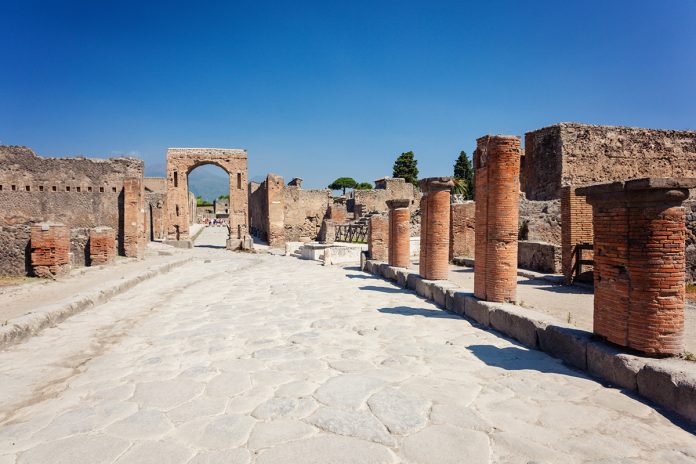Mariko Igimi, Professor from Kyushu University, Faculty of Law, reviews “Iusta case” from the perspective of familia
Sources of Iusta case
Legal documents on a dispute between a young woman, Iusta, and a widow, Themis, were found in the House of the Bicentenary, Herculaneum, a city covered by lahar from the eruption of Mount Vesuvius in 79AD, and are studied since around the second half of the 20th Century. They are called TABVLAE HERCVLANENSIS (or in short TH) 13 – 30, among the readable documents of 13 – 20 and 23 – 24, three of them are vadimonium (guarantee for court appearance) while eight are testimonies.
The main characters of this case are the following:
- Petronia Sp.f. Iusta (Iusta): disputing party, probably the plaintiff, daughter of Vitalis.
- Calatoria Themis (Themis): Iusta’s opponent, probably the defendant, widow of Stephanus.
- Petronia Vitalis (Vitalis): Iusta’s mother, Stephanus’ former slave, deceased.
- Petronius Stephanus (Stephanus): Themis’ late husband, the former owner of Vitalis and Telesphorus.
- Gaius Petronius Telesphorus (Telesphorus): Themis’ guardian, Stephanus’ former slave.
In TH16 – 20, each witness testifies that Iusta was freeborn (ingenua) because: he was present when Vitalis asked Stephanus and Themis to return Iusta in exchange for her alimenta (TH16); they heard Steph-anus saying that he will manumit Vitalis (TH17,18); they witnessed Stephanus replying “qui inuides filiae, cum eam nos filiae loco faciamus (why do you envy your daughter when we are treating her as our daughter?)” when Vitalis asked the couple to return Iusta (TH19,20). TH23 and 24 simply state that Iusta was freed by Calatoria Themis.
Freed or freeborn?
It has always been understood that TH16 – 20 are testimonies for Iusta who is claiming her freeborn status, while TH23 – 24 are for Themis contesting that Iusta is a liberta.
There are, however, several “mysteries” remaining in this interpretation, among which one of the most troublesome issues would be the “betrayal” of Telesphorus who appears as Themis’ guardian in TH13 and 14. In TH16, whereas the same Telesphorus testifies that Iusta was freeborn. Modern authors have been trying to solve the puzzle by ex. insisting that the guardianship was a mere formality, or assuming that Iusta was Telesphorus’ daughter. Other speculations are also raised to explain the reason why documents of both parties were found in one place.
Furthermore, there is an important issue yet to be discussed, i.e., what the conflict actually was in which both parties had interests. To find the intention behind Iusta’s claim, authors have, only been describing duties and limitations that unofficially freed slaves (iuniani latini) had to bear. The rational why Themis is litigating to defend herself is, beside the assumption of “adultery” of her late husband, hardly considered.
As their Greek cognomen suggest, Calatoria Themis as well as Petronius Stephanus were probably freed slaves. Recent research suggests that the population of liberti in Herculaneum of 1st Century was, in fact, the majority compared to the population of freeborn. Why then, did Iusta wanted to stand out and claim her status of ingenua so desperately? As I have discussed in the previous issues here and here, liberti were supported and protected by former owners. Why did Iusta intended to step out from the safety net of the familia?
A text from Digest & a reconstruction of Iusta Case
In Justinian’s Digest 34,1,16,1 (Scaevola), we find a case that a testatrix left aliment and a farm to all slaves she freed. The issue here was whether the libertus of her father’s freed slave would have a right to receive the bequest. The jurist replied that if the testatrix supplied maintenance during her lifetime to him, he would be a beneficiary, whereas if she did not, he would fall outside the scope of “her freed slave” and, therefore, not be entitled to acquire anything.
Let us now try to reconstruct the Iusta case based on the case of D.34,1,16,1 and the overall living conditions of freed slaves.
Iusta was living under the support of Stephanus and Themis as the daughter of Vitalis, freed slave of Stephanus. When Stephanus died and left aliment to all his freed slaves, Iusta thought she would be entitled to receive it because she considered herself as belonging to the Stephanus’ household. Themis, however, not wanting to provide maintenance to her, denied that Iusta was Stephanus’ freed slave by insisting that she was freeborn (TH17,18) and that she was just “treated as their daughter=freed slave (filiae loco faciamus)” and not their daughter =freed slave (=Vitalis?) herself (TH19,20).
As D.34,1,16,1 suggests, if Stephanus was providing her support during his lifetime, Iusta could still receive the bequest even if she was not manumitted by Stephanus. Therefore, Themis further had to prove that the alimenta was provided not from Stephanus, but from her mother, Vitalis. This delicate circumstance was testified by Themis’ trusted tutor, Telesphorus (TH16). In case that all these arguments would be denied, Themis alternatively claimed that Iusta was manumitted not by Stephanus, but by herself, for which she would have discretion over the treatment of Iusta.
According to this reconstruction, Telesphorus must have always remained loyal to the widow of his former owner. The reason for the fact that these documents were found in one place would be obvious, too, i.e., because they were all in support of Themis’ defence. It was crucial for both the parties, whether or not to provide aliment for Iusta because Iusta was much younger than Themis that the latter would most likely have to support the living of the former for all her life and if she wants to change the way of the supply, she will have to go through a complicated procedure (Ulpian D.2,15,8). For Iusta, on the other hand, to be or not to be a beneficiary of Stephanus’ bequest could directly affect her living conditions or even her survival.
Independence and freedom are important values for humanity in our modern society. Iusta, nevertheless, according to our reconstruction, preferred to belong to a familia than to be free but supportless.
This work was supported by JSPS KAKENHI Grant Number JP21K0114.
*This is a commercial profile.
© 2019. This work is licensed under CC-BY-NC-ND.











